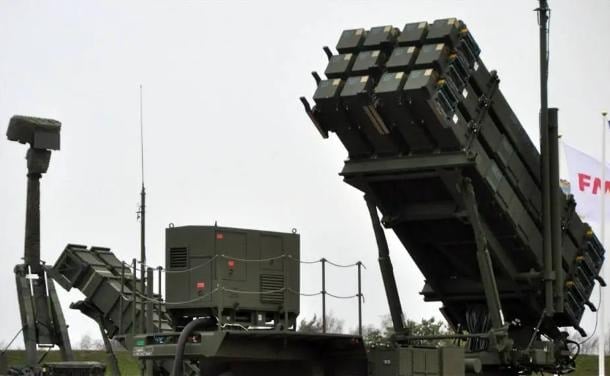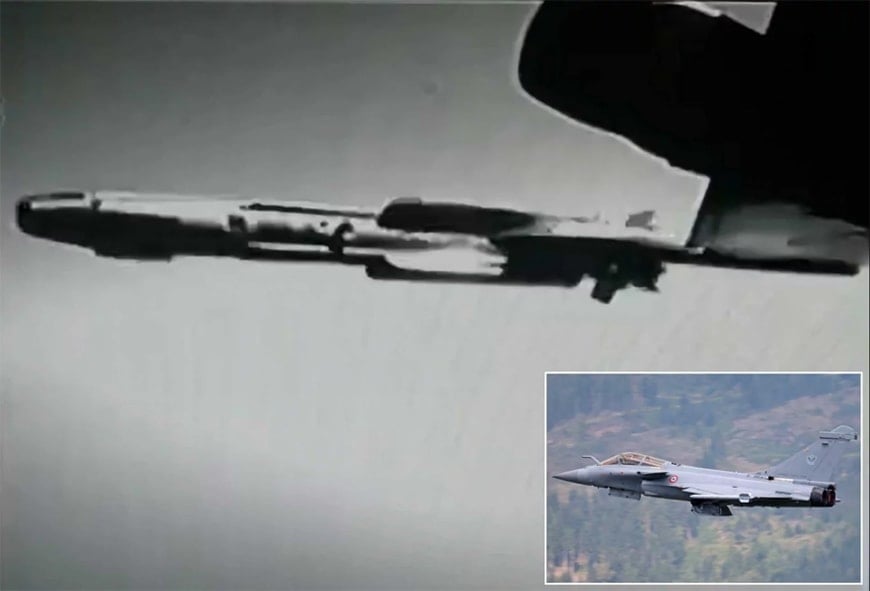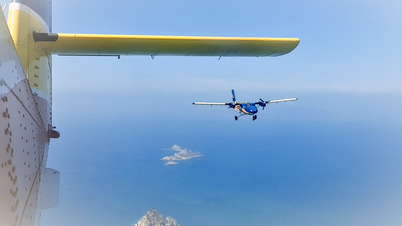* Italy: AW249 attack helicopter integrates multiple missiles and UAVs
At the Paris Air Show, Italian defense company Leonardo introduced the AW249 attack helicopter with three integrated missiles: FZ275, Akeron LP and Brimstone.
The AW249 is a new generation combat helicopter developed to replace the AW129 Mangusta helicopter of the Italian Army. With a maximum take-off weight of 8.3 tons and the ability to carry a weapon load of up to 2.8 tons, the helicopter is equipped with 2 General Electric CT7-8E6 turbine engines with a capacity of about 2,500 horsepower each, ensuring performance when operating at high altitudes and hot weather.
 |
In addition to the ability to integrate many advanced missile systems from leading European missile manufacturers, the AW249 helicopter can also add UAVs to its arsenal, helping to expand the attack boundaries. Photo: Army Recognition Group |
The helicopter is equipped with modern survival systems, including infrared suppressors, radar warning receivers, laser threat detectors and a fully integrated defensive support suite. The airframe incorporates crash-resistant structures and stealth features that enhance the helicopter's survivability.
The 70mm FZ275 laser-guided missile provides the helicopter with close-in support attack capability. The Akeron LP long-range precision -guided missile provides the ability to engage a wide range of targets, including armored vehicles and fortified positions; fire-and-forget and semi-automatic options are available. The Brimstone radar- and laser-guided attack missile excels in high-speed engagements against moving armored targets and is known for its high accuracy.
In addition to the above missiles, Leonardo also introduced an unmanned aerial vehicle (UAV) that, according to observers, Leonardo will likely integrate it with the AW249 helicopter.
* Lockheed Martin “offers” UK missile defense system
In a move that underscores the growing need for robust air and missile defense systems, Lockheed Martin – the world’s largest defense contractor – has offered to help Britain build an advanced missile shield.
According to a recent report by the House of Commons Library, the UK has no dedicated domestic ballistic missile defence system. Existing platforms such as the Sky Sabre, which uses the Joint Air Defence Modular Missile with a range of around 25km, and the high-velocity Starstreak missile designed for short-range defence up to 7km, are mainly tactical systems. These platforms are effective against UAVs, helicopters and low-flying aircraft, but less effective against ballistic or hypersonic missiles.
 |
| A Patriot PAC-3 MSE air defense missile system. Photo: Swedish Armed Forces |
So the focus of Lockheed Martin’s proposal is the PAC-3 MSE – a hit-to-kill interceptor system designed to destroy incoming ballistic missiles, cruise missiles and advanced aircraft through direct collision. The PAC-3 MSE has a range of about 35km, capable of attacking targets at altitudes of up to 25km. Notably, this system allows the launcher to carry up to 16 missiles instead of just four like the previous Patriot variants.
Lockheed Martin also introduced the Terminal High Altitude Area Defense (THAAD) system with a range of 200km and the ability to attack targets at altitudes of up to 150km. With the AN/TPY-2 X-band radar, THAAD can detect and track targets at ranges of up to 1,000km.
In an era of hypersonic missiles, UAVs and great power competition, missile defense is no longer optional but essential. Whether the UK takes up Lockheed Martin’s offer or charts its own course, the decision will shape British security for decades. According to Bulgarian Military, the UK’s upcoming defense investment plan, due to be published this fall, could clarify the country’s priorities.
* France successfully tested the MICA NG air-to-air missile
According to the French Defense Procurement Agency (DGA), France has just successfully test-fired the MICA NG air-to-air missile - a new generation interceptor, combat and self-defense missile - from a Rafale aircraft. This result marks an important step towards mass production of this missile.
 |
| A French Rafale fighter jet successfully launched the new MICA NG air-to-air missile during a test. Photo: French Ministry of Defense |
MICA NG is an improved version of the MICA missile. With a length of 3.1m, a diameter of 160mm, and a weight of about 112kg, MICA NG is compatible with existing launch rails and vertical launch systems. The missile is equipped with an imaging infrared sensor, an active electronically scanned array RF seeker, so it can operate in all weather conditions and engage beyond visual range.
Compared to the current generation of French air-to-air missiles, the MICA NG has an extended range, advances in search technology and flexibility in combat. The MICA NG has an inertial guidance system supported by a two-way data link that allows locking on to the target after launch, then guiding itself with a seeker. The missile's operating range is extended to 60-80km in air-launch situations (about 40km if launched from the ground), maintaining a speed above Mach 4 (4,940km/h). The missile uses a fragmentation warhead with a proximity or impact fuse.
Improvements in the NG version also include electronic resilience, target discrimination and mid-flight datalink guidance, allowing it to outperform its predecessors in electronic warfare environments. This positions the MICA NG as a next-generation air dominance asset for both the French Air Force and Navy.
MAI HUONG (synthesis)
* Today's World Military column on the People's Army Electronic Newspaper sends readers the latest information on world military security and defense activities in the past 24 hours.
Source: https://baodaknong.vn/quan-su-the-gioi-hom-nay-23-6-truc-thang-tan-cong-aw249-cua-italy-tich-hop-nhieu-ten-lua-256362.html






























![[Photo] Gia Lai provincial leaders offer flowers at Uncle Ho's Monument with the ethnic groups of the Central Highlands](https://vphoto.vietnam.vn/thumb/1200x675/vietnam/resource/IMAGE/2025/7/9/196438801da24b3cb6158d0501984818)






































































Comment (0)